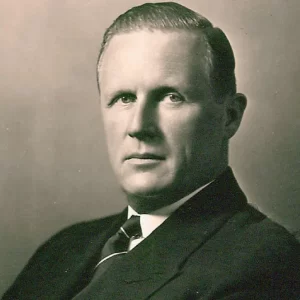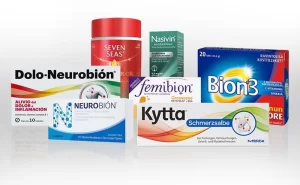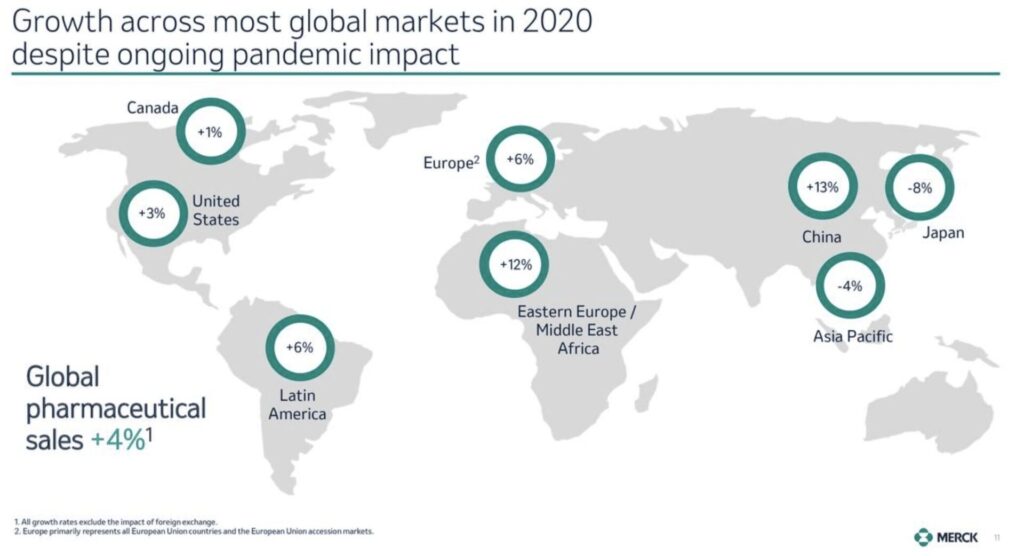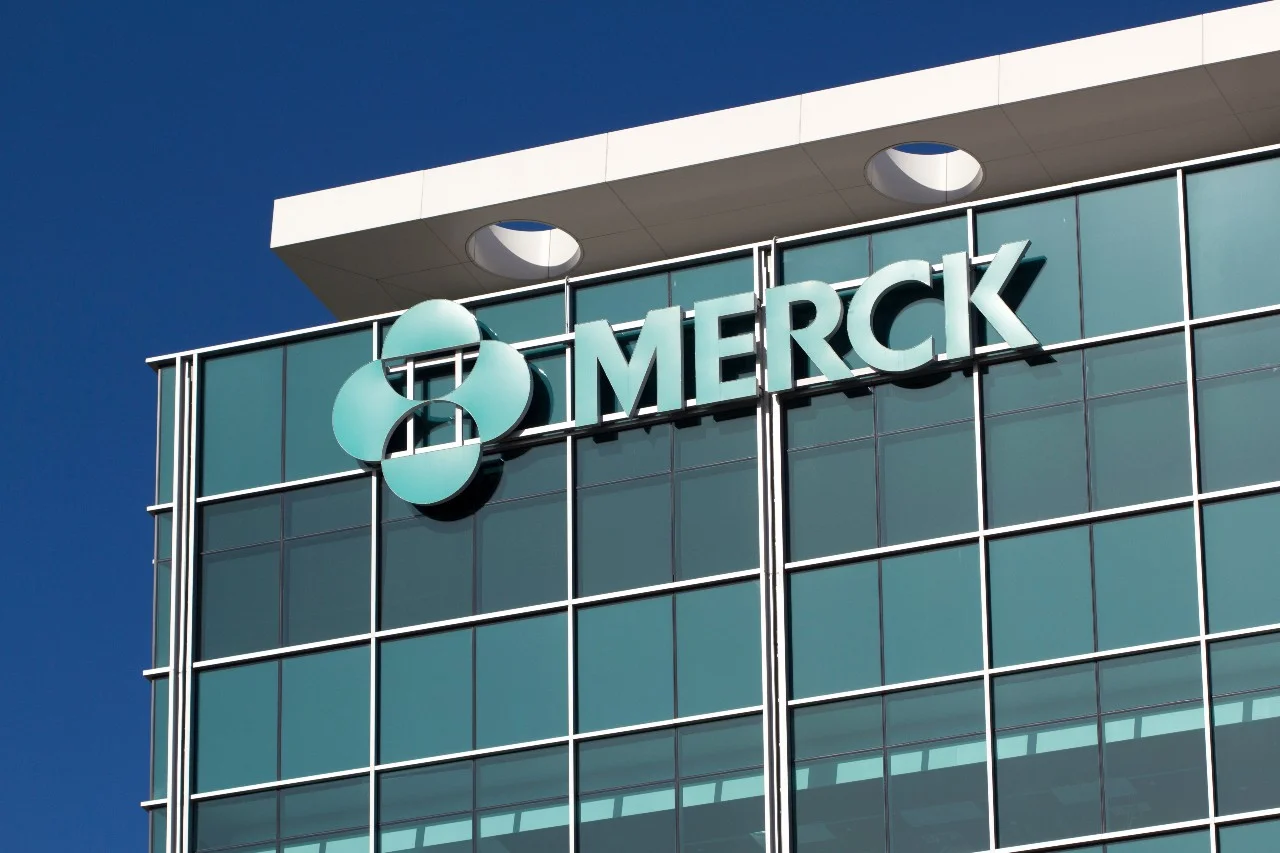Merck & Co., Inc., commonly known as Merck in the United States and Canada and MSD elsewhere in the world, stands as a titan in the global pharmaceutical industry. With a rich legacy stretching back over 130 years, the company’s unwavering dedication to scientific advancement has positioned it as a pioneer in developing life-saving medicines and vaccines.
Founded in 1891 as an American subsidiary of the German company Merck Group, Merck & Co. embarked on a path of independent growth in 1917. This pivotal moment set the stage for a company driven by a singular purpose: to use the power of science to save and improve lives. Throughout its history, Merck & Co. has consistently demonstrated its commitment to this mission by investing heavily in research and development (R&D). The company’s unwavering dedication to innovation has resulted in a groundbreaking portfolio of medicines and vaccines that have transformed the treatment landscape for numerous diseases.

One of the hallmarks of Merck & Co.’s success lies in its unwavering commitment to a diverse and robust product portfolio. The company’s offerings span across various therapeutic areas, including oncology, infectious diseases, vaccines, neuroscience, and immunology. This multifaceted approach allows Merck & Co. to address a wide range of healthcare needs and improve the lives of individuals from all walks of life.
A testament to the company’s impact are its groundbreaking contributions to the field of human health. From developing the world’s first measles vaccine to pioneering treatments for cancer, HIV/AIDS, and hepatitis C, Merck & Co. has consistently pushed the boundaries of scientific exploration. The company’s unwavering commitment to research continues to yield groundbreaking discoveries, with a robust pipeline of potential therapies holding the promise of addressing future healthcare challenges.
Beyond its scientific prowess, Merck & Co. also recognizes its responsibility to operate as a responsible corporate citizen. The company actively engages in initiatives that promote sustainability, environmental responsibility, and social good. This commitment extends to its global workforce, where Merck & Co. fosters a diverse and inclusive environment that empowers its employees to reach their full potential.
Merck & Co. stands as a testament to the transformative power of scientific innovation and unwavering dedication to human health. Its unwavering commitment to research and development, diverse product portfolio, and global impact have solidified its position as a leader in the healthcare industry, constantly striving to create a healthier future for all.
Marketing Strategies of Merck
Merck employs a multi-faceted marketing strategy encompassing various aspects across its three distinct business sectors:
1. Product Portfolio
Founded in 1668, Merck, a German science and technology giant, offers a diverse product portfolio spanning several sectors. This includes widely recognized pharmaceutical drugs like Keytruda and Januvia, alongside groundbreaking vaccines like Gardasil (HPV) and the first commercially available smallpox vaccine in the U.S. Additionally, Merck caters to animal health needs and offers a variety of other products, encompassing liquid crystals, essential chemicals for life sciences and performance applications, solutions for bioprocessing, and both small molecules and biopharmaceuticals.

Merck strategically focuses on crucial healthcare areas like oncology, vaccines, infectious diseases, and cardio-metabolic disorders. This targeted approach allows them to cater to specific healthcare needs and contribute significantly to advancements in these crucial fields. Their comprehensive product portfolio reflects a commitment to innovation and improving the health of both humans and animals worldwide.
By combining their rich history with a diverse product portfolio and targeted focus areas, Merck strives to be a leader in scientific and technological advancements that contribute to a healthier and more sustainable future. Their dedication to innovation and addressing critical healthcare needs positions them as a key player in the global scientific landscape.
2. Market Segmentation
Merck segments its business based on its internal organization and reporting structure. This structure reflects the different business models of its sectors, which in turn leads to similar risk profiles within each segment. This approach allows them to effectively allocate resources and assess the performance of each business unit.
One of the key customer segments identified by this structure is wholesalers. These are individuals or companies that purchase large quantities of Merck’s products, such as vaccines and pharmaceutical medications. Wholesalers then distribute these products to pharmacies, hospitals, and other healthcare providers, acting as a vital link in the supply chain.
Merck’s diverse product portfolio caters to various healthcare needs across the globe. They have been in the business of developing and delivering innovative health solutions for over 130 years. Their offerings include prescription medicines, vaccines, biologic therapies, and animal health products, demonstrating their commitment to improving human and animal well-being.
3. Research and Development Communication
Merck operates a global network dedicated to transforming scientific discoveries into life-saving medicines and vaccines. Their R&D process involves a clear pathway, starting with candidate discovery and continuing through preclinical and clinical development, all the way to gathering real-world data to ensure effective use.
Collaboration is a cornerstone of Merck’s R&D approach. Their teams actively work with customers in the life science field, transforming ideas into practical solutions. This collaborative spirit extends beyond their internal network, fostering partnerships in diverse areas like drug delivery compounds, engineering services, and analytical research. Ultimately, Merck’s R&D teams are driven by the belief that scientific exploration holds the key to improving and saving lives.
Merck’s R&D network is structured to facilitate efficient innovation. Global Project and Alliance Management (GPAM) plays a crucial role by ensuring alignment and coordinated execution across projects and partnerships. Analytical Research and Development (AR&D) focuses on advancing the pipeline at every stage, from initial discovery to final commercialization. Furthermore, the M Ventures BioIncubator, established in Israel, fosters innovation by nurturing promising startups. This comprehensive network empowers Merck’s R&D efforts to continuously deliver groundbreaking solutions for a healthier future.
4. Relationships with Healthcare Professionals
Merck recognizes the critical role healthcare professionals play in promoting global health and well-being. They maintain a dedicated team of clinically trained professionals who focus on preventing workplace-related illnesses and injuries while ensuring quality healthcare for their employees.
Investing in the expertise of healthcare professionals is another key pillar of Merck’s relationship-building strategy. The Merck Foundation collaborates with qualified individuals, engaging them as consultants and advisors to contribute valuable insights and expertise. Additionally, Merck adheres to the ethical guidelines established by the Pharmaceutical Research and Manufacturers of America (PhRMA) regarding interactions with healthcare professionals. These guidelines ensure transparency and responsible engagement in all interactions.
Collaboration extends to the realm of clinical research. Merck conducts clinical trials only when supported by sound scientific methodology, ensuring research is relevant and valuable not just for patients and healthcare professionals, but for society as a whole. Furthermore, their Global Human Health Executive Development Program empowers future healthcare leaders by fostering talent development, business acumen, and customer focus. Through these diverse initiatives, Merck demonstrates its commitment to building strong and collaborative relationships with healthcare professionals, ultimately aiming to improve global health outcomes.
5. Digital Marketing
Merck prioritizes understanding customer needs by leveraging the power of digital marketing. Their marketing team utilizes digital listening and patient analytics to gain valuable insights into customer concerns and preferences. Additionally, they harness information from various sources, including sales data, internet activity logs, and third-party research reports, to build a comprehensive understanding of their target audience.
Beyond customer insights, Merck actively embraces digital transformation strategies to optimize its operations. These strategies encompass cutting-edge technologies like artificial intelligence, cloud computing, big data, 3D printing, and supply chain management, enabling them to streamline processes and enhance efficiency.
One notable example of their digital transformation efforts is the MyCHC project. This initiative focuses on developing a digital platform that empowers both physicians and patients to make informed decisions regarding diagnosis and treatment options. The platform further aims to simplify appointment scheduling and follow-up procedures, offering a seamless and convenient user experience. By embracing innovative digital solutions, Merck demonstrates its commitment to continually improving customer engagement and healthcare outcomes.
6. Global Expansion
Merck has established a significant global presence, operating in over 140 countries. This dedication to global expansion has yielded positive results, with global diversification contributing to a 1.8% increase in group net sales to €5.3 billion.
New healthcare products are a key driver of Merck’s global expansion strategy. The company continuously invests in research and development to bring innovative solutions to the market, addressing diverse healthcare needs across the globe. Emerging markets also hold significant growth potential, and Merck is strategically redeploying resources and leveraging its financial strength to capitalize on these opportunities.

Latin America exemplifies Merck’s success in emerging markets. Currently, the company holds the second-largest market share in the region, demonstrating its commitment to providing healthcare solutions tailored to the specific needs of Latin American patients. It’s worth noting, however, that due to legal restrictions, Merck operates under different brand names in Canada and the United States, using MilliporeSigma for Life Science, EMD Serono for Healthcare, and EMD Electronics for their Electronics business. Through its dedication to global expansion and innovation, Merck strives to make a positive impact on healthcare outcomes around the world.
7. Corporate Social Responsibility (CSR)
Merck’s approach to CSR goes beyond traditional philanthropy, encompassing both innovation in healthcare solutions and sustainable business practices. They believe in using their scientific expertise to address global health challenges while ensuring their products are accessible and affordable to those in need. This commitment is reflected in their long-term investments in research and development, particularly in areas with significant impact, such as infectious diseases and vaccines.
Merck demonstrates its CSR commitment through various initiatives. The Merck Fellowship Program, for example, supports six fellows annually. Additionally, they actively participate in programs aimed at providing medicine access to underprivileged communities in developing countries. Furthermore, they have set ambitious goals for reducing greenhouse gas emissions, demonstrating their dedication to environmental sustainability.
Ensuring ethical conduct is another pillar of their CSR strategy. Merck upholds a comprehensive Code of Conduct, translated into 27 languages, and reinforces ethical behavior through employee training programs. Their CSR policy serves as a framework for their social responsibility efforts, outlining their commitment to various cause areas. By integrating social responsibility into their core values, Merck strives to make a lasting positive impact on the world around them.
By implementing these comprehensive marketing strategies, Merck strives to achieve its vision of becoming a global leader in science and technology, delivering innovative solutions that improve lives and contribute to a better future.
Marketing Mix of Merck
Here’s a detailed breakdown of Merck’s Marketing Mix (4Ps), with a focus on their global healthcare business:
1. Product
Merck offers a vast and diversified product portfolio that addresses a wide array of healthcare needs. Their key offerings include:
Prescription Medicines: Merck offers a diverse range of prescription medications across various therapeutic areas, including oncology (cancer treatment), cardiology (cardiovascular health), metabolic care (diabetes management), and infectious diseases (antibiotics, antivirals). They also have a growing portfolio in areas like immunology, neurology, and women’s health.
Merck invests heavily in R&D, aiming to develop first-in-class and best-in-class medications that address unmet medical needs and improve patient outcomes. They build brand recognition and loyalty for its key products through targeted marketing campaigns and by highlighting their unique features and benefits compared to competitors.
Vaccines: Merck is a global leader in vaccine development, offering vaccines for various preventable diseases like measles, mumps, rubella, human papillomavirus (HPV), hepatitis B, and more. They also actively contribute to global vaccination programs and initiatives.
Merck focuses on developing combination vaccines that protect against multiple diseases in a single shot, improving immunization coverage and convenience. They invest in research on adjuvants, which are substances added to vaccines to enhance the immune response and improve vaccine efficacy.
Biologic Therapies: As a leader in biologics, Merck offers innovative therapies that target specific biological pathways or molecules involved in disease processes. They are exploring personalized medicine approaches in biologics, tailoring treatments to individual patient characteristics and genetic profiles for improved effectiveness. While focusing on new biologics, Merck also explores opportunities in developing biosimilars, providing patients with more affordable access to these advanced therapies.
Animal Health Products: Merck offers a range of products for companion animals, covering areas like parasite control, pain management, and vaccinations. They provide solutions for improving the health and well-being of livestock animals, focusing on areas like productivity, disease prevention, and antibiotic stewardship. Merck emphasizes its commitment to responsible animal research practices and ensuring the well-being of animals throughout the product development process.
2. Price
Cost-Based Pricing: While R&D costs are a significant factor, Merck considers other elements like manufacturing costs, marketing expenses, and expected market demand when determining the initial price of a product.
Value-Based Pricing (VBP): Merck is increasingly exploring VBP models, where the price of a medication is linked to the health outcomes it delivers. This approach aims to align the cost of healthcare with its value to patients and society.
Market Access Strategies: In developing countries and regions with limited resources, Merck may implement access programs, differential pricing strategies, or partnerships to ensure their essential medicines are available and affordable to patients who need them the most.
Price Transparency: Merck strives for greater transparency in drug pricing, providing information on factors influencing pricing decisions and collaborating with stakeholders to address affordability concerns.
3. Place (Distribution)
Tiered Distribution Network: Merck utilizes a multi-layered distribution network, working with various partners to ensure efficient product delivery across different regions and healthcare settings.
Wholesalers and Distributors: They collaborate with large pharmaceutical wholesalers and distributors who have established logistics infrastructure to reach pharmacies, hospitals, and clinics.
Direct Sales Force: In specific markets, Merck employs a dedicated sales force to directly engage with healthcare institutions and build stronger relationships with key decision-makers.
Temperature-Controlled Supply Chain: For products requiring specific storage or transportation conditions, such as vaccines and biologics, Merck implements a robust temperature-controlled supply chain to maintain product integrity and quality.
E-commerce Platforms: In some cases, Merck may partner with authorized online pharmacies to offer certain products directly to patients, adhering to relevant regulations and ethical considerations.
4. Promotion
Targeted Communication: Merck recognizes the diverse needs of different healthcare professionals and utilizes targeted communication strategies. For example, they engage in detailed scientific discussions and clinical data presentations with doctors, while providing nurses and pharmacists with information on product administration, safety, and potential side effects.
Digital Marketing: Merck leverages digital channels like their website, social media platforms, and search engine marketing (SEM) to reach healthcare professionals and patients with relevant information about their products, disease awareness campaigns, and educational resources.
Patient Advocacy Groups: Merck may collaborate with patient advocacy groups to raise awareness about specific diseases and treatment options, ensuring patients have access to accurate information and support networks.
Compliance with Ethical Guidelines: All promotional activities strictly adhere to industry codes of ethics and relevant regulatory guidelines to ensure transparency, accuracy, and responsible communication with healthcare professionals and patients.
Public Relations: Merck engages in public relations activities to build a positive brand image and reputation. This may involve sponsoring healthcare conferences, participating in public health initiatives, and issuing press releases about new product developments or research advancements.
Corporate Social Responsibility (CSR): Merck integrates CSR initiatives into their marketing strategies, highlighting their commitment to social responsibility and access to healthcare in under-resourced communities. This can involve collaborating with NGOs, providing patient assistance programs, or supporting research on neglected diseases.
By carefully considering and tailoring each element of their marketing mix, Merck strives to deliver innovative healthcare solutions, reach target audiences effectively, and ultimately, contribute to improving health outcomes globally.
Also Read: Marketing Strategy and Marketing Mix of Pfizer
To read more content like this, subscribe to our newsletter




